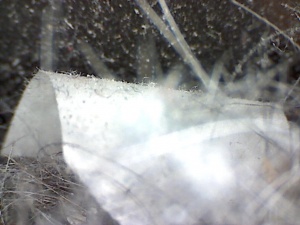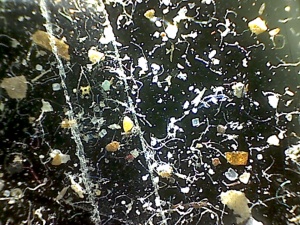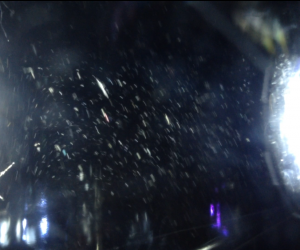User:Nan Wang/ thesis03-12: Difference between revisions
No edit summary |
No edit summary |
||
| Line 147: | Line 147: | ||
Concentrate on Image and sound making process | Concentrate on Image and sound making process | ||
Steps and compare to theory. | Steps and compare to theory. | ||
| Line 157: | Line 161: | ||
The noisy nature of dust, both visually and sound wise, which I discover with my experiment by using dust put on 16 mm film optical sound track to generate audio noise. And my experiment on displaying the dust video on LCD screen; take the changing luminant intensity and interval from the screen generate sound using a hack analog synthesizer with light sensor. I will intergrade and compare my hands on research above with the forensic and cultural research of impurity and the complexity nature of dust material. | The noisy nature of dust, both visually and sound wise, which I discover with my experiment by using dust put on 16 mm film optical sound track to generate audio noise. And my experiment on displaying the dust video on LCD screen; take the changing luminant intensity and interval from the screen generate sound using a hack analog synthesizer with light sensor. I will intergrade and compare my hands on research above with the forensic and cultural research of impurity and the complexity nature of dust material. | ||
{{vimeo|72536017}} | |||
2,Dust on film | 2,Dust on film | ||
| Line 167: | Line 171: | ||
compare to construction film. | compare to construction film. | ||
{{vimeo|64263931}} {{vimeo|77894056}} | |||
3,Archiving the dust | 3,Archiving the dust | ||
Revision as of 06:05, 18 March 2014
“…For the microscopic debris that covers our clothes and bodies are the mute witnesses, sure and faithful, of all our movements and of all our encounters.”
---Locard, Edmond, The Analysis of Dust Traces, American Journal of Police Science, 1(3), 1930, 279-298.
Abstract
The research object included in this text is dust.
My works mainly focusing on abstraction video and sound, using both digital and analogue media,
researching how micro-perceptions and fragmented memories, construct individual past reality.
Since I attract by dust, gradually it become instrument for sound, elements for images, object to sort,
grammar of my works. I am taking the position of sound and image-maker, interpreted dust under
interdisciplinary context, and then intergrade into my works conceptually materially and visually.
Introduction:
I have a strong obsession towards dust, this research topic keep coming to me and dives me to create works related to.
There are two main elements of dust that I found deeply related to image making: Narrative nature and time elements.
In chapter one, I will state in detail what is dust. And look at it in a forensic perspective; consider dust as a trace of evident
indicates pass events. Following with the research of house dust material, especially in air-borne fine dust, which contains
80% of our dead body cells. In this case, dust becoming the abandoned waste from old version of us. We leave trance of
dust wherever we go. I consider dust is the evident of existence however in an absurd way.
Dust always has contradictory meanings: beautiful also deadly; everywhere, yet always been ignored; detached from its original
body forming as compound of impure and complex material however meaningless and nihilistic.
In chapter two, I will keep research dust in details. Following the two themes underlying narrative and time element from
chapter one, I will state the extension elements under those two themes and how they related to my hand on research and
conceptual building from all my dust series works.
Dust and sound- the noisy and impure nature of dust.
The noisy nature of dust, both visually and sound wise, which I discover with my experiment by using dust put on 16 mm
film optical soundtrack to generate audio noise. And my experiment on displaying the dust video on LCD screen; take the
changing luminant intensity and interval from the screen generate sound using a hack analog synthesizer with light sensor.
I will intergrade and compare my hands on research above with the forensic and cultural research of impurity and the
complexity nature of dust material.
Put dust on film- compress time in the past tense.
Film always consider as time base media. When I start to stick dust on 16mm black and white film play it in 24 frames per
second or I scanned the dust digitally and play back as 25 frames animated film. The time and narrative elements of dust
have been compressed. The condense narrative and time behind dust images becoming an overloaded audiovisual
experience.
Archiving the dust—sorting, manipulating, transmitting and erasing.
Sorting the dust with archiving it in both digital and analog. Compare these two media and the means of reservation of
materials. And manipulate the dust by editing in filmmaking and translating the dust from physical material to scanned
digital files then recapture the image from digital display. I also consider dust as signals keep transmitting from one media
to anther until it loses its recognisable shape. Compare this hands-on practice with waste memories been remediated
reinterpreted again and again by re-picture it. Every time we re-picture from the past, part of memory will re-interpreted
re-mediated re-remembered. Until the memory gets completely false or distorted blurred alienated from its own source.
Follow this methodology above; I also will look into the air-borne nature of house dust, and the new definition of human
interaction under this context. State the notion of micro level of martial exchange by inhaling each other in the same space
without any physical touch. This concept related to the spacial setting of my work. How to distribute my dust at the exhibition
area, being everywhere without present myself.
Chapter three, I will describe and document the making of my graduation project in details. Concentrate on the relation
between light, dust, images, and sound in technical level. Including description of the settings and final layout of the project,
also my expectation of overall audio-visual special experience for audience.
CHAPTER 1
Dust pilling up in our life. Quietly appearing on the surface of our shelves; floor; table, every corner inside our room.
They always flowing and spreading around us and been considered as Abandoned unwanted, annoying or unpleasant waste of our life.
One day, I take a close look at the dust in my room, before they end up inside vacuum cleaner.
I saw cookie crumbs, sweater fluff, cat fur, my hair, and tobacco debris…
I smoke a cigarette after I comb my hair during the morning; guess visit my living room sit together with my cat drank a cup of coffee with
cookies; my friend wearing grey sweeter lying against my cushion…
All the narrative fragments happened in my life start to unfold in front of my eyes…
1. what is dust
-The evidence of being.
I will state in detail what is dust. And look at it in a forensic perspective; consider dust as a trace of evident indicates pass events. Following with the research of house dust material, especially in air-borne fine dust, which contains 80% of our dead body cells. In this case, dust becoming the abandoned waste from old version of us. We leave trance of dust wherever we go.
I consider dust is the evident of existence however in an absurd way.
Dust always has contradictory meanings: beautiful also deadly; everywhere, yet always been ignored; detached from its original body forming as compound of impure and complex material however meaningless and nihilistic.
2 Dust and trace
-The underlying narrative
First I will look at dust from a forensic perspective, how forensic expert Locard, Edmond solving a crime by investigating dust and trace.
Deduction use for investigating a crime by looking at trace, putting clues together and deduct what happened to a crime scene.
This approach by looking at micro-material and generate images of pass. Imaginary and Imagery both are key elements of crime investigation.
This forensic research and cases study from < The Analysis of Dust Traces > written by Locard Edmond 1930, inspired my of a material based abstraction filmmaking.
What will happens if I only display micro-material as abstraction visual elements. Can I use dust as clues and intervals of flicker images and sound as simulation. Let audience generate self-directed imaginative images and narrative?
3, The time element
-Consider dust as past tense of grammar
In the field of literature, dust has been conceptualized as matter-in-waiting and decay.
Georges Bataille: “a stealth-like incursion from the future that slowly disavows the vitalism of all that it touches.”
Pre-existent realities. Prior events. Older and abandon vision of ourselves. As sound and image-maker, I use dust as past tense grammar for narrative telling. Waste. Abandon.
Dust makes me look at how human interaction and communication in different angle. The air-borne nature allows micro-material exchange between us without physical contact.
The metabolism process of our bodies keeps sloughed waste and dead skin cells. We leave trace of material base evidence through space and time. As air-borne micro –material, dust spread distribute and diffuse in space. When we encounter with others. There always Micro Material exchange, without physical touch. We are constantly inhaling others around us. Others take small part of our metabolism process, we inhaling others and exhaling, sloughing excess waste back to the air again.
4, The noisy and redundancy nature:
Dust takes form of particles, yet big enough to identify its origin visually.
A mixture of micro-compounds. Noisy, Impure and complex nature visually and material wise.
consider dust as Data packets.
CHAPTER 2
Capture and sorting the dust:
In chapter two, I will keep research dust in details. Following the two themes underlying narrative and time element from chapter one, I will state the extension elements under those two themes and how they related to my hand on research and conceptual building from all my dust series works.
Concentrate on Image and sound making process
Steps and compare to theory.
1,Dust and sound
- the noisy and impure nature of dust.
The noisy nature of dust, both visually and sound wise, which I discover with my experiment by using dust put on 16 mm film optical sound track to generate audio noise. And my experiment on displaying the dust video on LCD screen; take the changing luminant intensity and interval from the screen generate sound using a hack analog synthesizer with light sensor. I will intergrade and compare my hands on research above with the forensic and cultural research of impurity and the complexity nature of dust material.
2,Dust on film
-- compress time in the past tense.
Film always consider as time base media. When I start to stick dust on 16mm black and white film play it in 24 frames per second or I scanned the dust digitally and play back as 25 frames animated film. The time and narrative elements of dust have been compressed. The condense narrative and time behind dust images becoming an overloaded audiovisual experience.
compare to construction film.
3,Archiving the dust
—sorting, manipulating, transmitting and erasing.
Sorting the dust with archiving it in both digital and analog. Compare these two media and the means of reservation of materials. And manipulate the dust by editing in filmmaking and translating the dust from physical material to scanned digital files then recapture the image from digital display. I also consider dust as signals keep transmitting from one media to anther until it loses its recognizable shape.
Compare this hands-on practice with waste memories been remediated reinterpreted again and again by re-picture it. Every time we re-picture from the pass, part of memory will re-interpreted re mediated re-remembered. Until the memory gets completely false or distorted blurred alienated from its own source.
notes:The archaeology nature of dust(The discipline of things) The discipline of things chapter5 Documents and imagery Digital analog memories The discipline of things chapter6 Futures for things: Memory Practices and digital translation.
- The alienation of dust images.
4, Distribute my dust
-martial exchange by inhaling each other
Follow this methodology above; I also will look into the air-borne nature of house dust, and the new definition of human interaction under this context. State the notion of micro level of martial exchange by inhaling each other in the same space without any physical touch. This concept related to the special setting of my work. How to distribute my dust at the exhibition area, being everywhere without present myself.
CHAPTER 3:
The construction of Dust room:
In chapter 3, I will describe and document the making of my graduation project in details. Concentrate on the relation between light,
dust, images, and sound in technical level. Including description of the settings and final layout of the project, also my expectation
of overall audio-visual special experience for audience.
Bibliography
Dust - A Study in Sociological Miniaturism
-Gary Alan Fine and Tim Hallett
Archaeology: The Discipline of Things
The Analysis of Dust Traces.
-Edmond Locard
Theory and Definition of Structural/ Materialist Film
IMPURE MATTER:
A Forensics of WTC Dust
-Susan Schuppli
FORUM: NEW MATERIALISM New Materialism as Media Theory: Medianatures and Dirty Matter
-Jussi Parikka
The Hidden Sense Synesthesia in Art and Science
The Spirit inside Each Object: John Cage, Oskar Fischinger, and “The Future of Music”
-Richard_Brown
Visual Music
- Maura McDonnell, 2007
Today’s and Tomorrow’s Retrieval Practice in the Audiovisual Archive
Sounding Images
and Imaging Sounds - Audiovisual
Interactivity in Performance
-Kathleen Maloney
The ear
of the voice of the eye
-Yannis Kyriakides
Video Vortex Reader II: moving images beyond YouTube
WEB VIDEO AND THE SCREEN AS A MEDIATOR AND GENERATOR OF REALITY
-ROBRECHT VANDERBEEKEN
Articles:
BBC-SKIN
Pulverulence
-Steven Connor



